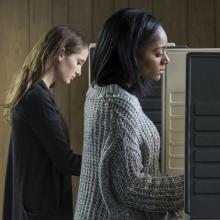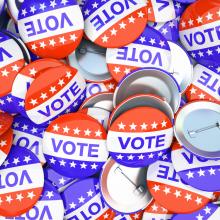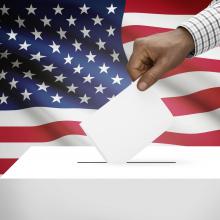North Carolina

Image via Kanok Sulaiman / Shutterstock.com
Facing a Justice Department deadline to throw out the “bathroom bill,” Gov. Pat McCrory of North Carolina has instead filed suit against the federal government, reports NBC News.

Photo via YouTube / Office of Governor Pat McCrory
The department is giving North Carolina until May 9 to confirm that the state "will not comply with or implement HB2."

Image via Burlingham / Shutterstock.com
A judge upheld North Carolina’s controversial election laws on April 25, reports The New York Times.
The ruling comes months before a presidential election in a state that narrowly went to Barack Obama in 2008 and to Mitt Romney in 2012.

Image via wavebreakmedia / Shutterstock.com
Citing “religious liberty” as a reason for denying one class of citizens bathroom access, equal housing, or services is a human rights violation.
That’s the finding of the U.S. Commission on Civil Rights, an independent, bipartisan agency that advises the president and Congress on civil rights matters. The commission issued a statement April 18 saying it “strongly condemns recent state laws passed, and proposals being considered, under the guise of so-called ‘religious liberty’ which target members of the lesbian, gay, bisexual, and transgender (LGBT) community for discrimination.”
Today is the first time I have ever been arrested in Washington, D.C. I came for the same reason Southern political leaders petitioned President Grant to send troops in the 1870s — for the same reason Dr. King called upon Presidents Kennedy and Johnson to enforce federal law in the 1960s. I came because the interposition and nullification of extremists is blocking a Third Reconstruction in America today.

Photo via YouTube / Office of Governor Pat McCrory
After significant backlash from both activists and corporations, North Carolina Gov. Pat McCrory (R) amended a state law that eliminated anti-discrimination protections for gay and transgender rights.

Rev. William J. Barber II. Image via twbuckner / Wikimedia Commons
The leader of the “Moral Mondays” movement and a prominent New York minister are joining forces for a 15-state “moral revolution” tour to counter the nation’s conservative voices.
“Way too much of our national discourse has been poisoned by hateful language and policies,” said the Rev. William J. Barber II, who brought thousands to weekly protests at the North Carolina General Assembly, in an announcement.

North Carolina state house. Image via Konstantin L / Shutterstock.com
Attorney General Roy Cooper said March 29 that he will not defend the new state law that prohibits local governments from approving LGBT protections, reports The New York Times. Lambda Legal and the North Carolina ACLU have filed suit against the state.

2014 Moral March in Raleigh, N.C. EPG_EuroPhotoGraphics / Shutterstock.com
Meeting for a one-day emergency session last week, North Carolina’s General Assembly passed HB2, which has been widely criticized as the nation’s worst anti-LGBT bill. In supposed defense of the general welfare, conservative lawmakers moved to stop a Charlotte ordinance that would have allowed transgender citizens to use public restrooms of the gender with which they identify. But their call to “protect our women and children” echoes language of the white supremacy campaign that overthrew local governments in this state 120 years ago. Both then and now, the call to defend families against imagined predators is a crude power grab.

Image via Koksharov Dmitry/Shutterstock.com
North Carolina's voter ID law, which requires would-be voters to display an acceptable form of government-issued voter ID in order to cast a ballot, went into effect for the first time in last night's primary. Early voting behaviors offered a first look at some of the problems that come with these voting restrictions, reports ThinkProgress. Namely, how young people are being blocked from voting.
This tenth annual People’s Assembly was made up of black, white, and brown, gay and straight, rich and poor, labor and civil rights, Democrats, Republicans, and Independents, people of faith and people whose moral visions are rooted in reason or politics. Planned Parenthood advocates marched in pink hats alongside evangelicals, singing the same freedom songs. Black Lives Matter activists linked arms with elderly white veterans. The Moral March did not rally around a messiah candidate but challenged all leaders to serve the common good with policies that are morally sound, constitutionally consistent, and economically sane. While a kaleidoscope of campaigns vie for everybody’s attention, this long-term, grassroots coalition to reconstruct democracy in America is a movement to hold all candidates accountable.
Our lawyers have made a strong case this week that the voter ID component of this legislation places an unnecessary and undue burden on voters — especially poor and African-American voters. We will ultimately win this fight in the courts. But this case is about much more than defeating voter ID laws. It is about a central question of 21st-century American politics: is a multiethnic democracy possible?
Jewish scholar Abraham Joshua Heschel introduced Martin Luther King, Jr. to a rabbinical assembly in 1968, “a voice, a vision, and a way.”
“The whole future of America will depend on the impact and influence of Dr. King,” Heschel said.

Image via Niyazz/Shutterstock
Today is the 50th anniversary of the landmark Voting Rights Act, passed Aug, 6, 1965. The act, signed into law by President Lyndon B. Johnson, created key provisions to prevent racial discrimination in voting laws.
The Voting Rights Act has been called "the single most effective piece of civil rights legislation ever passed by Congress."
Today's anniversary is a bittersweet commemoration. In 2013, the Supreme Court struck down Section 4, which had required Alabama, Alaska, Arizona, Georgia, Louisiana, Mississippi, South Carolina, Texas, and Virginia to seek federal approval before imposing changes to voter laws.
NC NAACP vs. McCrory is a necessary interruption to the institutionalized racism that is killing black and brown people. For all the talk around “black lives matter,” Rev. Barber warns, we are in danger of only affirming that black death matters if we accept that the martyrs of Charleston deserve nothing more than the removal of a Confederate flag from their state house. Yes, the flags should come down. But if they go away while the unjust laws remain, then it may be even harder for us to see that the root of injustice is in an imbalance of power.
And the fundamental power of citizenship in this country is still the franchise.
This week, North Carolina’s legislature overrode its Republican governor’s veto to allow magistrates and clerks to refuse to perform same-sex marriages.
This unprecedented move — never before have state employees been allowed to simply stop doing their jobs — comes at a time of profound debate regarding same-sex marriage. It is exactly the wrong move.
By the end of June — and as early as next week — the Supreme Court is expected to rule on the legality of gay marriage nationwide. In a pre-emptive move to refocus narrative and legislative control at the state level, two states this week enacted laws designed to protect religious objection to same-sex couples. Here's how.
A sheriff in one of North Carolina’s smallest counties told registered sex offenders they can’t go to church, citing a state law meant to keep them from day-care centers and schools.
Graham County Sheriff Danny Millsaps told sex offenders about his decision Feb. 17, according to a letter the Asheville (N.C.) Citizen-Times obtained March 6. About 9,000 people live in Graham County, which abuts Great Smoky Mountains National Park on the Tennessee line in western North Carolina.
“This is an effort to protect the citizens and children of the community of Graham (County),” he wrote.
“I cannot let one sex offender go to church and not let all registered sex offenders go to church.”
He invited them to attend services at the county jail.
MARQUETTA L. GOODWINE, a computer scientist, mathematician, and community organizer, grew up on the Sea Islands off the coast of South Carolina. On July 2, 2000, Goodwine was “enstooled,” in a traditional African ceremony, as “Queen Quet,” political and spiritual leader of the Gullah/Geechee Nation that extends from coastal North Carolina to Jacksonville, Fla.
“A lot of people don’t know that we exist,” she told Sojourners. “People are unaware that there is a subgroup of the African-American community that’s an ethnic group unto itself, with nationhood status for itself.”
Queen Quet, and the Gullah/Geechee Sea Island Coalition she founded, are actively engaged in battling environmental racism and climate change. As a cultural leader of an Indigenous community, she works to preserve her people’s heritage in the land and stop corporate encroachment. As a spiritual leader of a people who practice a unique form of faith that adheres to Christian doctrine while being distinctly African, she nurtures her people’s tradition of communal prayer, song, and dance, as well as their connection to Praise Houses, the small places of worship built on plantations during slavery.
Sojourners contributing writer Onleilove Alston, lead organizer in Brooklyn for Faith in New York, a member of the PICO National Network, sat down with Queen Quet on St. Helena Island in Beaufort County, South Carolina, to learn more about the Gullah/Geechee people, their spirit, and their struggle for justice. —The Editors
THE GULLAH/GEECHEE PEOPLE are the descendants of African people that were enslaved on the Sea Islands. We are descendants of Igbo, Yoruba, Mende, Mandinka, Malinke, Gola, Ife, and other ethnic groups from the Windward Coast of Africa, as well as Angola and Madagascar.
We also have Indigenous American ancestry from the Cusabo, Yamasee, Cree, and Edistow, the original inhabitants of the land now held in the Gullah/Geechee Nation. A socio-anthropologist segregated us at one point, saying that Gullahs are on the South Carolina Sea Islands and Geechees are on the Georgia Sea Islands, but there is no difference between us. We are one people.
In 1999, I became the first Gullah/Geechee in history to speak before the United Nations. Now I am a member of the International Human Rights Association of American Minorities, an NGO with U.N. consultative status, and the International Human Rights Council (a coalition of human rights scholars and activists that works on key human rights issues).
I believe that deep within our being is a longing for a moral compass. For those of us who are moved by the cries of our sisters and brothers, we know that, like justice, the acts of caring for the vulnerable, embracing the stranger, healing the sick, protecting workers, welcoming and being fair to all members of the human family, and educating all children should never be relegated to the margins of our social consciousness. These are not just policy issues; these are not issues for some left vs. right debate; these are the centerpieces of our deepest traditions of our faiths, of our values, of our sense of morality and righteousness.
We must remind those who make decisions regarding public policy what the prophet Isaiah said "Woe unto those who legislate evil ... Rob the poor of their rights ... make children and women their prey." Isaiah 10: 1-2
Martin Luther King, Jr. said 46 years ago in one of his last sermons that if you ignore the poor, one day the whole system will collapse and implode. The costs are too high if we don’t address systemic racism and poverty. It costs us our soul as a nation. Every time we fail to educate a child on the front side of life, it costs us on the back side — financially and morally.








